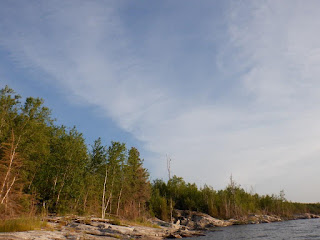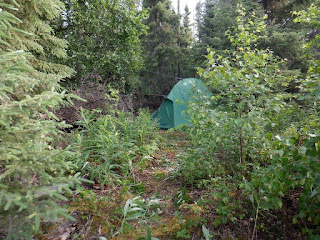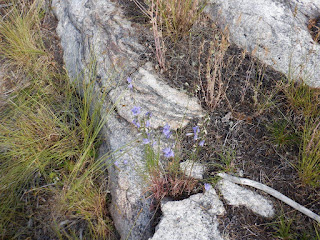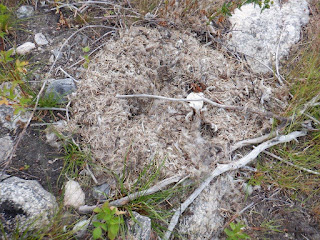********************** CAMP 14 **********************
July 13 sunrise through forest fire smoke (03:50 - 04:31).
Bald eagle watches me approach on my way towards the Churchill River.
Have to be careful where I sit when I stop for breakfast at 06:19.
Camp 14 looking back the way I came.
The view up the Churchill river from Camp 14. At the corner of the island can be seen evidence of the rapid current.
Across the river is the mainland shore where in 2017 a curious wolf sat watching my camp. I keep a lookout but do not hear or see him this year. I am hot and sweaty in the 31°C temperature.
The old fireplace has not been used since last time evidenced by the growth of a one metre tall birch tree.
Strong wind requires weighing down the Tarp shelter lower support rope. I saw off the upper rope's anchor tree by standing on a barrel; it is a tall dead spruce that unsafely overhung the Tarp.
The tent site through a patch of tall fireweed.
Almost ripe red currants.
A small cluster of bluebells, too beautiful to pick. There are plenty of currants and fireweed for salad.
A Canada goose nest.
July 13, no question about the source of the forest fire smoke now. There are a lot of visible flames, as in the last photo above.
This video illustrates how the fire belches smoke like a giant locomotive with the strong wind blowing it up the mainland towards me but parallel to camp.
July 14 morning, very evident that the fire is moving up the mainland towards my camp, with multiple separate hotspots popping up spread by the strong wind.
**********************
Summary:
Travel 16 km to reach camp 14 on a small island in the Churchill river in Manitoba. Sweat-soaked just paddling in temperatures over 30°C. Spreading rapidly in the presence of strong wind, forest fire nearby belches smoke very high like a giant locomotive. Bright flames visible as fire devours trees. No luck fishing, getting lure snagged badly once. Late the next day turn back after spending only one night at camp 14 then become windbound and forced to camp again after only five km.
********************** CAMP 14 **********************
July 13:
Up to the alarm at 03:00, I wear the headnet as mosquitoes are bad; upon leaving I doff it when the bugs are less bothersome on the lake. One km away I stop for breakfast on an exposed rock shore. There is a quartering wind until I have to turn directly east for four km into a stiff headwind. The source of the smoke becomes more obvious as I progress. It is a hot 31°C when I land at the target island by 11:30; I have been sweating just paddling. I camped here in 2017 when I travelled the opposite direction down the Churchill River. By the time I get to camp 14 after travelling 16 km, smoke is belching up very high due to the strong southeast wind. The fire is five km southeast beside the Churchill River as it exits my lake. The wind is blowing smoke in a long intimidating trail like a giant locomotive. Thankfully the wind so far is blowing smoke parallel to the northeast past camp rather than directly over it. At times I can see bright flames at the base of the smoke as it devours spruce and pine trees, not a reassuring sight. The mainland east of camp is three km away but then turns west to within one km north of camp. There is a large island just east of camp within 400 metres of the mainland where the fire appears to be headed. With the strong wind sparks can be carried far away so being on an island does not guarantee protection. I am in Manitoba 15 km east of the Saskatchewan border and three km up the Churchill River from its entrance into the lake. The size of the fire should now make it appear on the fire map for Manitoba; Jeanette checks both Saskatchewan and Manitoba fire maps.
It appears nobody has used the campsite since I created it in 2017. A one metre tall birch sapling is growing in the fireplace which is close to the almost vertical rockface two metres above the Churchill river flowing briskly past. The tent site is overgrown with tall fireweed and raspberry canes with some overhanging brush and trees, taking ½ hour to clear. From my journal: "As I start to erect the tent, one of the bungee cords lacing the four sections of a pole together breaks. On upending the pole bag one section gets caught in the drawstring. Aie! Now I know to hold the drawstring aside when sliding the poles out of the bag and do it gently! I've gotten away with the wrong technique for years. Thinking of how I got my sore shoulder it's 'deja vu all over again'. I think there's a device missing to hold the cord at the end of the bottom pole but searching the ground and bag it cannot be found. Finally I realize there is no such device; I think the knot in the end of the cord came undone. Opening the Stove Bag, I get wire (used to suspend the stove pipes) to run through the poles to remove any debris. With a long length of new cord tied to the free end of the retracted line I manage to pull it through all four sections. It takes two attempts because the knot comes undone; it can't be too big or it will jam inside the pole. Needing three hands I have to use my teeth at one point to anchor the cord. Leaving the new cord attached I tie a very big knot around and over the initial knot, hoping it holds. Yay ... it works! Takes at least ½ hour. This in the presence of flies of all sizes including wasps zooming all round my face, worse because I'm sweating heavily. Aie!" After lunch, I get the Tarp shelter up. Many dead trees have to be removed to make room in a somewhat protected spot. One end of the supporting rope has to be tied to a tall dead limbless spruce. Afterwards I stand on a barrel to saw the tree above the rope as I am concerned about the tree falling especially because the wind is so strong. I chuckle when I realize that someone viewing the cut may think it took a very tall person. Because of the wind I face the bottom of the Tarp towards shore, tied as low as possible, ropes weighed down with big poles.
Throughout the day, sweat-soaked in the 31°C heat I drink lots of water using the LifeStraw®. For supper I have macaroni and cheese, an easy meal requiring a small fire. I keep the fire well-controlled by sawing solid dry firewood which burns slowly and by soaking the area several times around the fireplace. A much needed bath before bedtime is very welcome, but not so the dozens of flies, some successfully biting; their sting really hurts! One side of the tent has a decent level area for my bed. With no clothes on I sleep on top of the cotton sheet until early morning before donning pyjamas, still laying on top of the bed. Before falling asleep I debate whether to leave tomorrow, even turning on the alarm. My older self says that is crazy talk. With distant thundering, hoping for rain without lightning strikes, I turn off the alarm. The wind keeps up all night, of course making forest fire conditions worse.
July 14 morning:
Camp 14 on the 14th! Up by 05:00, 22°C, the wind is now only light. Before exiting the tent, the sound of rapids fools me into thinking the wind is stronger. There is blue sky in the west with stratus white clouds. To the east is more cloud and smoke. The forest fire is still puffing upwards. First priority is fishing, trying spots all the way around the island with not a single bite, snagging weeds in places. Walking around the island is a challenge through thick bush and brush, only being able to cast from a few places. Once I hook a submerged tree and think at first I will have to cut the line. Not giving up I get a long dead pole with some small branches on top. Managing to wiggle the pole underneath the line I successfully retrieve the hook. Of course the line is all wrapped up in the pole's nooks and crannies but at least I have saved the leader and lure and much of the line. Finally back to camp by 08:40 I eat breakfast of fresh bannock while sitting in some shade overlooking the river. At 09:30 I am undecided if tomorrow I should head upstream to see how far I can actually go. If the current is too strong to allow me to reach the major rapids which come around both sides of a big island I would return to this same campsite to set up again. The other option is to assume I cannot get there and start heading back. Either way I plan moving on tomorrow. I only need one more fish meal this week and know I will have better success elsewhere.
By 11:00, wind increasing and temperature rising, the forest fire is growing and appears to have at least five to seven different hot spots spread by the wind each belching smoke. Although I would like to continue upstream even if to confirm I cannot get past the big rapids, I decide to turn back. The fire is moving my way and I have been fortunate to not be inundated with smoke yet but my luck is certainly likely to run out.
********************** CAMP 15 **********************
July 14 at camp 15, late supper, Tarp shelter not set up.
July 14 evening, smoke of forest fire seen from camp 15.
********************** CAMP 15 **********************
July 14 afternoon:
Leaving by 15:00 it is certainly a late time to start the day's journey. Strong west wind, coupled with the current, pushes me down the Churchill river. Waves are a combination of current and wind when sometimes my paddle hits mostly air as waves overtake the canoe. Waves get worse when I hit the shallower water of the lake. It is a relief after I get the three km to the lake proper and turn south. But I am not so relieved when I reach the turn where I head west directly into the very strong wind. Hoping to get back to the previous camp or at least to an isle that looked promising four km due west, I try hard but cannot battle the headwind any longer. There are only so many indentations on shore where I can get some partial protection. As I round the peninsula I am not happy to see not only the fire to the east, but a large amount of smoke coming from the opposite direction indicating another big fire. There are no campsites along shore and I finally realize I cannot go any farther so paddle south to a very large island where there is a prominent small peninsula the closest to me. Retreating a bit I must quarter downwind to safely make headway. I manage to land in the lee of the point where I check for a possible campsite. Then I move on downwind to investigate two other areas, tramping through thick undergrowth and uneven ground with high shores. Finally I go back to the first location where I decide to set up camp. Rechecking several spots, some too exposed, I settle on one that needs some clearing and added moss to level the tent site. Nearby is a tiny inlet where I land to unload up the steep but short 10 metre slope. Behind where I would set up the Tarp shelter I park the canoe and gear not required for camp. Then I tackle the tent site, not sure if I will even erect the Tarp. Cutting out a dozen spruce trees and many overhanging large branches I throw them out of the way behind the tent site. I have to pull out small shrubs and saw big roots out of two alders then use the axehead to level the ground. A lucky find is thick moss nearby to gather four big armloads to finish the levelling process. Good enough, I set up the tent and lay out sleep gear. There is a small level damp spot in the notch of the landing that is well protected from the wind and safe for fire without building a fireplace on the bare damp ground. Directly beside it there is a one metre vertical rockface beside which I can get up a steep two metre slope to the tent. Sweat-soaked I am sure it reached over 30°C today. The point of the peninsula is exposed to the strong wind which feels good. Thinking I should have a bath, I decide to just have a handkerchief wash of face and neck. Even though only travelling five km, it has been a long tiring day and I want to eat and get to bed in reasonable time.
After a late supper, I check for messages with the satellite phone at 19:14 even though it is only Thursday; there are none but Jeanette would not usually leave messages before Saturday unless urgent. Next I phone home to ask Jeanette about the two fires. I was getting away from the large very visible fire to the east only to see smoke from another in the west. She will text later after she checks the fire web sites for Saskatchewan and Manitoba. She has quickly checked on her phone but will be able to get more complete information using a full screen computer.
With no Tarp up and no space cleared to do so, I prepack to leave first thing tomorrow, after momentarily considering staying for a day. To bed by 20:30.


















































